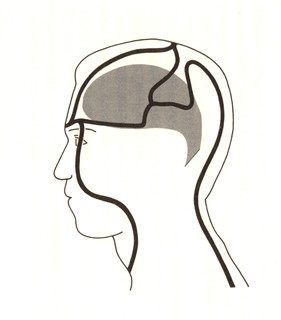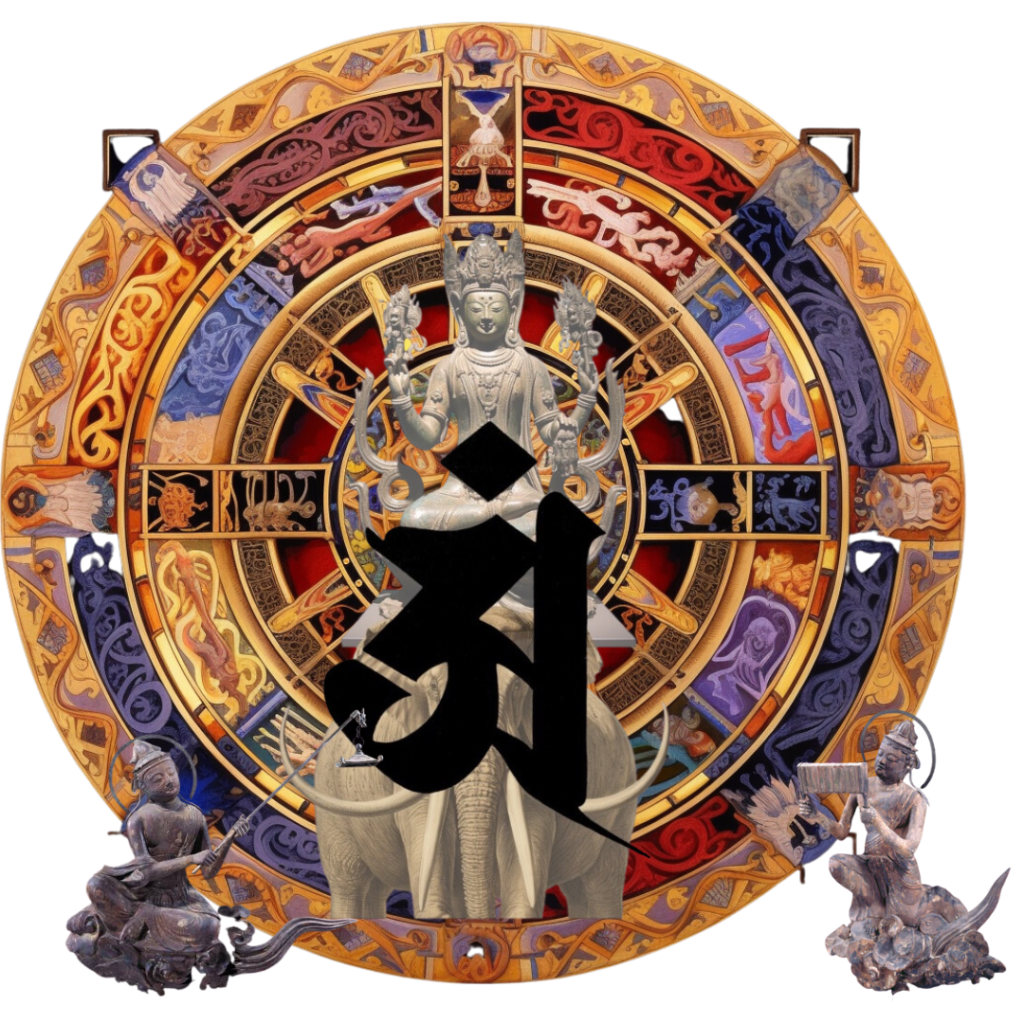
だから、仏陀のクンダリニー・エネルギーの使いかたは、クンダリニー・ヨーガの 手法とまったく異なり、クンダリニーを完全にコントロールしつつ使うのである。つ まり、クンダリニー・エネルギーを「行らせる」という手法である。 それはどのようにして、なされるのだろうか?
仏陀の法では、怪物クンダリニーを、ごくおだやかに、上機嫌(?)に目ざめさせ るのである。 どのように? 道教はクンダリニーを知らない。しかし、クンダリニーには到底およばないけれど も超常的な強い「気」のエネルギーを呼び起こす経穴(ツボ)を知ってこれを使っている。
これは道教の最極秘伝になっていて、これを知る人はごく稀である。(アンリ・マー スペロがその著書で、ちょっとこれにふれている)
この経穴(中国でツボと呼ぶ部位は、チャクラの一種であるとわたくしは考えてい る)は、クンダリニーのチャクラから、少し離れたところにある。道教は、いまいっ たように、このチャクラを使って強い「気」を呼び起こすのである。クンダリニーの 代わりといってよいだろう。クンダリニーそのものは、知らないのである。
いつしか消えてしまったのであろうかと、わたくしは考えている。いうならば、クン ダリニーという巨大モーターを起動させるための始動用小型モーターだけが、道教に 伝えられたと考えるわけだ。
クンダリニーという過激きわまるエネルギーを、みごとにコントロールして使う仏 陀のこの秘法には、ただただ感嘆するしかないのである。
だが、仏陀の秘法はこれだけではないのである。さらにおどろくべき秘技を、 仏陀はわれわれに教示するのである。
それは、ひと口にいうと、ピンガラとイダーの気道を、アクセルとブレーキに使う のだといったらよいであろう。ただし、これが、クンダリニー・ヨーガのピンガラ、 イダーそのものであるかどうかは、わからない。
或いは、仏陀があたらしくつくり出した気道であるのかも知れない。というのは、 クンダリニー・ヨーガのピンガラとイダーは、前にのべたように、脊柱を通るスシュ ムナー管の両側を上昇するのであるが、仏陀のこの二つの気道は、その反対側の、腹 部を上下するからである。しかし、わたくしは、この二つの気道の果たす機能からし
て、やはりこれはピンガラとイダーであって、仏陀がこのように変えられたのであろ うと思っている。したがって、この二つの気道を、やはり、ピンガラとイダーという 名称で呼ぶことにする。
いま、この二つの気道の機能からして、といったが、どういう機能を持っているの か?」 ピンガラ気道は、クンダリニー・エネルギーにたいし、発動・昂揚の機能を持つ。 イダーの気道は、沈静・凝縮の機能を持つ。 つまり、さきにいったように、アクセルとブレーキの役目を果たすのだ。 それは、つぎのように使われる。
二本のスシュムナー管
仏陀の法では、スシュムナー管がもう一本ある。つまり二本あるのだ。クンダリニ ー・ヨーガと正反対、尾祇骨から会陰を通って、腹部の正中線を真っ直ぐ、臍輪を経 て咽喉に至る気道である。目ざめたクンダリニーは、背部のスシュムナー管とともに、 この腹部スシュムナー管をも上昇する。(上昇するというより、上昇させるのだ)
この腹部スシュムナーのクンダリニー・エネルギーを、コントロールしつつ、各チ ャクラを開発、覚醒するのが、仏陀のピンガラ、イダーの両気道である。 つまり、臍輪から約五ないし八センチ(人によって個人差がある)ほど下の辺で、 腹部スシュムナーから分岐し、各チャクラおよび関連臓器、神経を行って上昇し、ま た、下降する。あるいは、咽喉からさらに脳の内部を、鼻柱の奥ふかく、眉間の深部 へと上昇し、脳のチャクラ、神経経路等を行り、延髄の小脳部分で、背部スシュムナ ー管と合流する。
この二つの気道の技法は、チャクラの開発・覚醒にぜったい必要で、これなくして チャクラの完全な開発・覚醒は不可能といってもいいであろう。殊に、視床下部、間
脳の辺の神経経路の増強には、不可欠の技法である。 まさに、神技というしかない微妙きわまる技法である。 では、この神技ともいうべき仏陀の法の修行は、どのようになされるのであろうか。 それは大別して、三つの法から成り立つ。 1、クンダリニーを覚醒する修行法 2、チャクラを開発する修行法 3、ピンガラ、イダーの気道を開発する修行法 である。 それは、特殊な呼吸法、独特な瞑想・観想、マントラ詠唱、ムドラー(手印、ポー ズ) などから構成される。その一つ一つについて解説しよう。ただし、本書は教習書 ではないので、実技の詳細については、著者の別の本(『求聞持聡明法秘伝』その他) を参照、または、著者に就いて実際に習得してほしい。
Therefore, the usage of Buddha's kundalini energy is completely different from the method of kundalini yoga, and it is used with complete control of kundalini. In short, it is a method of "making" Kundalini energy go. How is it done?
Buddha's secret method using Pingala and Ida
He would be wise not to make a stupid imitation that would provoke a sleeping Godzilla with a good feeling.
In Buddha's law, the monster Kundalini is awakened in a very gentle and good mood (?). How? Taoism doesn't know Kundalini. However, although it is far from Kundalini, he also knows and uses acupuncture points that evoke paranormal strong "Qi" energy.
This is the most secret of Taoism, and very few people know it. (Henri Marr's Spelo is a little touched on in his book)
This acupuncture point (I think that the part called acupuncture point in China is a kind of chakra) is a little away from the Kundalini chakra. Taoism, as he is now, uses this chakra to evoke a strong "Qi". It's a substitute for Kundalini. I don't know Kundalini itself.
I am wondering if it has disappeared someday. In other words, Kun thinks that only a small starting motor for starting a huge motor called Darini was passed on to Taoism.
The Buddha's secret method of using Kundalini, a radical energy that is brilliantly controlled, can only be admired.
However, this is not the only secret method of Buddha. The Buddha teaches us even more surprising secrets.
In a nutshell, it's his use of the Pingala and Eider airways for accelerators and brakes. However, I don't know if this is Kundalini Yoga's Pingala, Ida itself.
Or it may be the airway newly created by the Buddha. For Kundalini Yoga's Pingala and Ida, as mentioned earlier, ascend both sides of his Munner's canal through the spinal column, but these two airways of the Buddha are on the opposite side. This is because the abdomen goes up and down. However, I am due to the function of these two airways.
And again, this is Pingala and Ida, and he wonders if the Buddha was changed in this way. Therefore, we will call these two airways by the names of Pingala and Ida.
Now, from the functions of these two airways, what kind of function does it have? ”The Pingara airway has the function of activating and raising the kundalini energy. Eider's airways have the function of calming and condensing. In other words, as I said earlier, it acts as an accelerator and a brake. It is used as follows.
Two Sushmuner tubes
According to Buddha's law, there is another Sushmuner tube. In other words, there are two. Opposite to Kundalini Yoga, it is the airway from the caudal bone through the perineum, straight through the midline of the abdomen, through the navel ring to the throat. The awakened kundalini ascends this abdominal Sschmuner's canal as well as the dorsal Sushmuner's canal. (Rather than rising, raise)
It is the Buddha's Pingala and Ida airways that develop and awaken each chakra while controlling the kundalini energy of this abdominal sshmuner. That is, about 5 to 8 cm below the umbilicus (depending on the individual), it branches off from the abdominal sushmuner and rises and falls through each chakra and related organs and nerves. Alternatively, it rises further from the throat to the depths of the nasal column and deep between the eyebrows, follows the chakras of the brain, nerve pathways, etc., and joins the dorsal Sushmuner canal at the cerebellum part of the medulla oblongata.
These two airway techniques are absolutely necessary for the development and awakening of the chakra, and without it it would be impossible to fully develop and awaken his chakra. Especially in the hypothalamus, between
It is an indispensable technique for enhancing neural pathways around the brain. It is a delicate technique that can only be called a divine technique. Then, how is the practice of the Buddha's law, which can be called this divine technique, done? It is roughly divided into three laws. 1. A training method to awaken the kundalini 2. A training method to develop chakras 3. A training method to develop the airways of Pingala and Ida. It consists of special breathing methods, unique meditations / ideas, mantra chanting, mudra (hand marks, poses), etc. Let me explain each one. However, since this book is not a training book, please refer to another book by the author ("Kumon Mochi Satoshi Hosekiden" and others) for details of the practical skills, or ask the author to actually learn it.
【このカテゴリーの最新記事】
-
no image
-
no image
-
no image
-
no image
-
no image





